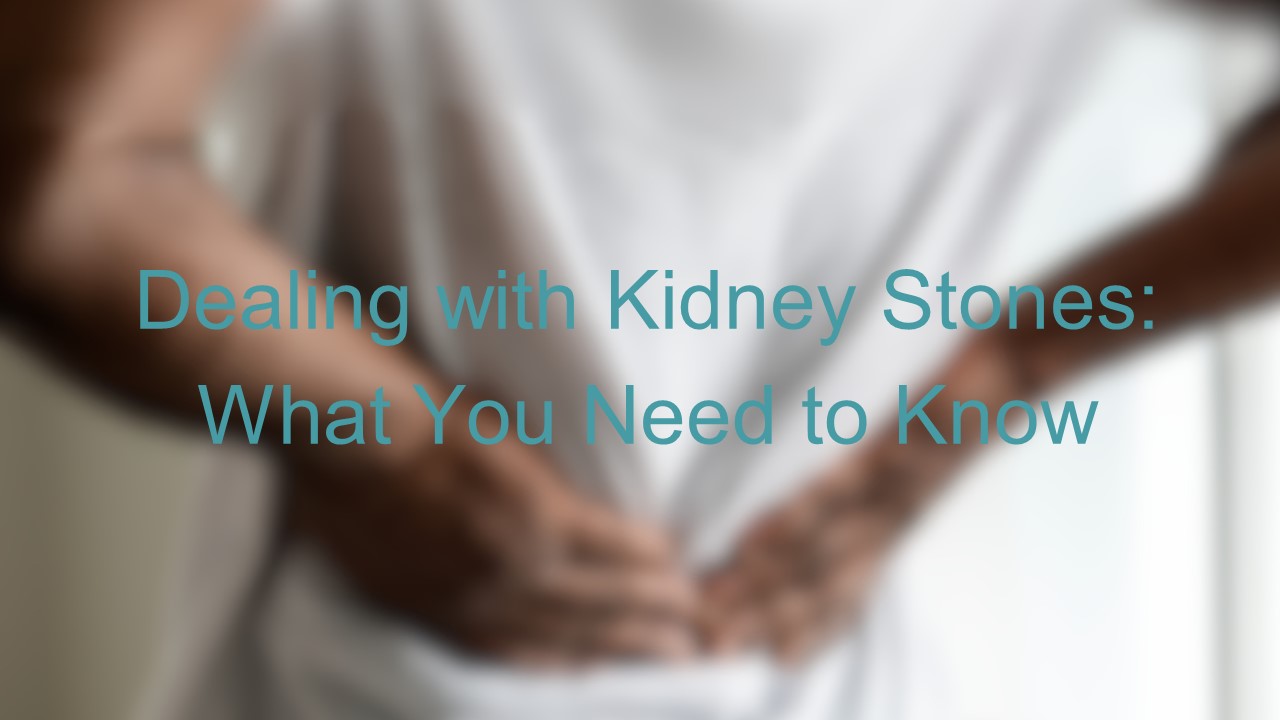Understanding Kidney Stones: A Comprehensive Guide - PowerPoint PPT Presentation
Title:
Understanding Kidney Stones: A Comprehensive Guide
Description:
Discover all you need to know about kidney stones in our presentation. Learn about causes, symptoms, and prevention strategies to tackle this common issue head-on. Whether you're dealing with kidney stones or want to prevent them, this guide has you covered. – PowerPoint PPT presentation
Number of Views:3
Title: Understanding Kidney Stones: A Comprehensive Guide
1
Dealing with Kidney Stones What You Need to Know
2
Kidney stones, those tiny yet intensely painful
formations in your kidneys, can turn your life
upside down. If you've ever experienced the agony
of passing a kidney stone, you know it's an
experience you'd rather not repeat. In this PDF,
we'll dive into what kidney stones are, why they
form, how to recognize the symptoms, and most
importantly, what you can do to prevent and treat
them.
3
What are Kidney Stones?
Hard deposits of minerals and salts that
accumulate inside your kidneys are called kidney
stones. They come in a range of sizes, from small
to massive. As these stones move through the
urinary tract, they may be extremely painful.
Their formation can be influenced by some
factors, including diet, dehydration, and certain
medical conditions. In order to help pass the
stone, treatment options include pain management,
increasing fluid intake, medication to help
dissolve the stone, and in certain cases,
surgical procedures to remove them.
4
Symptoms of Kidney Stones
- Severe pain This is usually the most noticeable
symptom, and it often begins suddenly. The pain
may originate in the side, back, or below the
ribs, and it may also radiate to the groin and
lower abdomen. - Painful urination You may experience pain or a
burning sensation while urinating, especially if
the stone is near the bladder. - Blood in the urine (hematuria) The presence of
blood in the urine can give it a pink, red, or
brownish color. - Frequent urination You may feel the need to
urinate more frequently than usual, even if only
small amounts of urine are passed. - Vomiting and nausea If a kidney stone is causing
severe pain, some patients may also experience
vomiting and nausea. - Cloudy or foul-smelling urine This can occur due
to an infection associated with the kidney stone. - Difficulty passing urine In some cases, the
kidney stone may block the flow of urine, leading
to difficulty and pain when trying to urinate.
5
Types of Kidney Stones
- Calcium stones Calcium stones are the most
common type of kidney stones and are typically
composed of calcium oxalate or calcium phosphate.
They form when calcium combines with oxalate or
phosphate in the urine. - Uric acid stones Uric acid stones form when the
urine contains too much uric acid, which can
occur due to factors like a diet high in purines
(found in foods like red meat and seafood),
certain medical conditions like gout, or
dehydration. - Struvite stones Also known as infection stones,
these can form due to urinary tract infections.
They are composed of magnesium, ammonium, and
phosphate and can grow quite large. - Cystine stones These stones are rare and form in
people with a hereditary disorder called
cystinuria, which causes the kidneys to excrete
too much of the amino acid cystine into the
urine.
6
Prevention Tips
- Stay hydrated by drinking plenty of water.
- Limit salt intake and avoid processed foods.
- Watch calcium intake from supplements and focus
on food sources. - Reduce consumption of oxalate-rich foods like
spinach and nuts. - Moderate protein intake, especially from animal
sources. - Limit foods high in purines, such as organ meats
and shellfish. - Maintain a healthy weight.
- Monitor calcium supplements under healthcare
guidance. - Manage underlying medical conditions that
increase stone risk. - Limit soda and sugary drink consumption.
7
By understanding the causes, symptoms, and
treatment options for kidney stones, you can take
proactive steps to prevent them and minimize
their impact on your life. If you suspect you
have a kidney stone or are experiencing symptoms,
don't hesitate to seek medical attention. If
kidney stones are not properly treated medically,
they may eventually result in bleeding, urinary
tract infections, and organ failure. Seeing a
urologist is highly advised if you think you
might have a kidney stone or are experiencing
issues with your renal system. Make an
appointment with us to receive individualized
care and treatment for all of your urology needs.






























